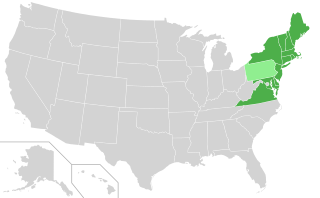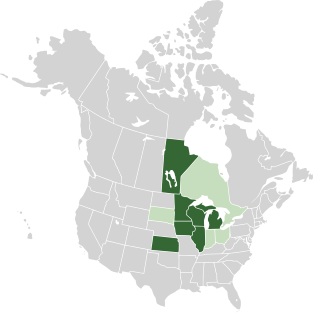
The Kyoto Protocol was an international treaty which extended the 1992 United Nations Framework Convention on Climate Change (UNFCCC) that commits state parties to reduce greenhouse gas emissions, based on the scientific consensus that (part one) global warming is occurring and (part two) that human-made CO2 emissions are driving it. The Kyoto Protocol was adopted in Kyoto, Japan, on 11 December 1997 and entered into force on 16 February 2005. There were 192 parties (Canada withdrew from the protocol, effective December 2012) to the Protocol in 2020.
The United Nations Framework Convention on Climate Change (UNFCCC) established an international environmental treaty to combat "dangerous human interference with the climate system", in part by stabilizing greenhouse gas concentrations in the atmosphere. It was signed by 154 states at the United Nations Conference on Environment and Development (UNCED), informally known as the Earth Summit, held in Rio de Janeiro from 3 to 14 June 1992. Its original secretariat was in Geneva but relocated to Bonn in 1996. It entered into force on 21 March 1994.

A carbon footprint is the total greenhouse gas (GHG) emissions caused by an individual, event, organization, service, place or product, expressed as carbon dioxide equivalent (CO2e). Greenhouse gases, including the carbon-containing gases carbon dioxide and methane, can be emitted through the burning of fossil fuels, land clearance and the production and consumption of food, manufactured goods, materials, wood, roads, buildings, transportation and other services.

The Regional Greenhouse Gas Initiative (RGGI, pronounced "Reggie") is the first mandatory market-based program to reduce greenhouse gas emissions by the United States. RGGI is a cooperative effort among the states of Connecticut, Delaware, Maine, Maryland, Massachusetts, New Hampshire, New Jersey, New York, Rhode Island, Vermont and Virginia to cap and reduce carbon dioxide (CO2) emissions from the power sector. RGGI compliance obligations apply to fossil-fueled power plants 25 megawatts (MW) and larger within the 11-state region. As of 2021, Pennsylvania is pending RGGI membership with an anticipated start in early 2022, and North Carolina is currently considering joining RGGI.
The Global Warming Solutions Act of 2006, or Assembly Bill (AB) 32, is a California State Law that fights global warming by establishing a comprehensive program to reduce greenhouse gas emissions from all sources throughout the state. AB32 was co-authored by then-Assemblymember Fran Pavley and then-Speaker of the California Assembly Fabian Nunez and signed into law by Governor Arnold Schwarzenegger on September 27, 2006.

Western Climate Initiative, Inc. (WCI) is a 501(c)(3) non-profit corporation which administers the shared emissions trading market between the American state of California and the Canadian province of Quebec as well as separately administering the individual emissions trading systems in the Canadian province of Nova Scotia and American state of Washington. It also provides administrative, technical and infrastructure services to support the implementation of cap-and-trade programs in other North American jurisdictions. The organization was originally founded in February 2007 by the governors of five western states with the goal of developing a multi-sector, market-based program to reduce greenhouse gas emissions; it was incorporated in its current form in 2011.

The Climate Registry (TCR) is a non-profit organization governed by U.S. states and Canadian provinces and territories. TCR designs and operates voluntary and compliance greenhouse gas (GHG) reporting programs globally, and assists organizations in measuring, reporting and verifying the carbon in their operations in order to manage and reduce it. TCR also consults with governments nationally and internationally on all aspects of GHG measurement, reporting, and verification.

The United States produced 5.2 billion metric tons of carbon dioxide equivalent greenhouse gas (GHG) emissions in 2020, the second largest in the world after greenhouse gas emissions by China and among the countries with the highest greenhouse gas emissions per person. In 2019 China is estimated to have emitted 27% of world GHG, followed by the United States with 11%, then India with 6.6%. In total the United States has emitted a quarter of world GHG, more than any other country. Annual emissions are over 15 tonnes per person and, amongst the top eight emitters, is the highest country by greenhouse gas emissions per person. Because coal-fired power stations are gradually shutting down, in the 2010s emissions from electricity generation fell to second place behind transportation which is now the largest single source. In 2020, 27% of the GHG emissions of the United States were from transportation, 25% from electricity, 24% from industry, 13% from commercial and residential buildings and 11% from agriculture. These greenhouse gas emissions are contributing to climate change in the United States, as well as worldwide.
The Emissions & Generation Resource Integrated Database (eGRID) is a comprehensive source of data on the environmental characteristics of almost all electric power generated in the United States. eGRID is issued by the U.S. Environmental Protection Agency (EPA).

The Midwestern Greenhouse Gas Reduction Accord is a regional agreement by six governors of states in the US Midwest who are members of the Midwestern Governors Association (MGA), and the premier of one Canadian province, whose purpose is to reduce greenhouse gas emissions to combat climate change. The accord has been inactive since March 2010, when an advisory group presented a plan for action to the association with a scheduled implementation date of January 2012. Signatories to the accord are the US states of Minnesota, Wisconsin, Illinois, Iowa, Michigan, Kansas, and the Canadian Province of Manitoba. Observers of the accord are Indiana, Ohio, and South Dakota, as well as the Canadian Province of Ontario.

Climate change in Canada has had large impacts on the country's environment and landscapes. The number of climate change–related events, such as the 2021 British Columbia Floods and an increasing number of forest fires, has become an increasing concern over time. Canada's annual average temperature over land has warmed by 1.7 degrees Celsius since 1948. The rate of warming is even higher in Canada's north, the Prairies, and northern British Columbia. The country's precipitation has increased in recent years and extreme weather events have become more common.

The climate change policy of the United States has major impacts on global climate change and on global climate change mitigation. This is because the United States is the second largest emitter of greenhouse gasses in the world after China, and is among the countries with the highest greenhouse gas emissions per person in the world. In total the United States has emitted over 400 billion metric tons of greenhouse gasses, more than any country in the world.
This article is about the Kyoto Protocol and government action in relation to that treaty.
The, United States Environmental Protection Agency (EPA) began regulating greenhouse gases (GHGs) under the Clean Air Act from mobile and stationary sources of air pollution for the first time on January 2, 2011. Standards for mobile sources have been established pursuant to Section 202 of the CAA, and GHGs from stationary sources are currently controlled under the authority of Part C of Title I of the Act. The basis for regulations was upheld in the United States Court of Appeals for the District of Columbia in June 2012.
The Cities for Climate Protection program (CCP) is one of three major global transnational municipal networks aimed at reducing urban greenhouse gas emissions. Established in 1990 by the International Union of Local Authorities and the United Nations Environment Programme, one of the largest global transnational networks, the International Council for Local Environment Initiatives (ICLEI), presented a framework to represent local government environmental concerns internationally. The ICLEI strives to ‘establish an active and committed municipal membership… that promotes environmental and sustainable development initiatives within…[a] framework of decentralised cooperation’. In 1993, subsequent to an ICLEI successful pilot scheme, the Urban CO2 Reduction Project, the CCP program was established during the post-Rio Earth Summit era. The CCP program illustrates itself within local climate policy, as a Transnational governance network.
Thermal credits is a new holistic concept which corresponds to the percentage of the climate impact saving obtained through mitigation and adaptation measures applied against global warming, taking as reference the global temperature rise projected in a given time scale. Thermal credits are measured in percentages of global warming reduction in a given time.

The New England Governors and Eastern Canadian Premiers' Annual Conference is an annual international meeting of the American governors of the six New England states of Connecticut, Maine, Massachusetts, New Hampshire, Rhode Island, and Vermont as well as the Canadian premiers of Quebec, Nova Scotia, New Brunswick, Prince Edward Island and Newfoundland and Labrador. According to the Council of Atlantic Premiers, the meeting is meant to "advance the interests" of the states and provinces as well as to encourage "cooperation" built on the "historic ties" between them The first conference was held in 1973. In 2014, the 38th annual conference was held at Bretton Woods in northern New Hampshire.

A nationally determined contribution (NDC) or intended nationally determined contribution (INDC) is a non-binding national plan highlighting climate change mitigation, including climate-related targets for greenhouse gas emission reductions. These plans also include policies and measures governments aim to implement in response to climate change and as a contribution to achieve the global targets set out in the Paris Agreement.

The California Global Warming Solutions Act of 2016: emissions limit, or SB-32, is a California Senate bill expanding upon AB-32 to reduce greenhouse gas (GHG) emissions. The lead author is Senator Fran Pavley and the principal co-author is Assemblymember Eduardo Garcia. SB-32 was signed into law on September 8, 2016, by Governor Edmund Gerald “Jerry” Brown Jr. SB-32 sets into law the mandated reduction target in GHG emissions as written into Executive Order B-30-15.
California has taken legislative steps in the hope of mitigating the risks of potential effects of climate change in California by incentives and plans for clean cars, renewable energy, and pollution controls on industry.












